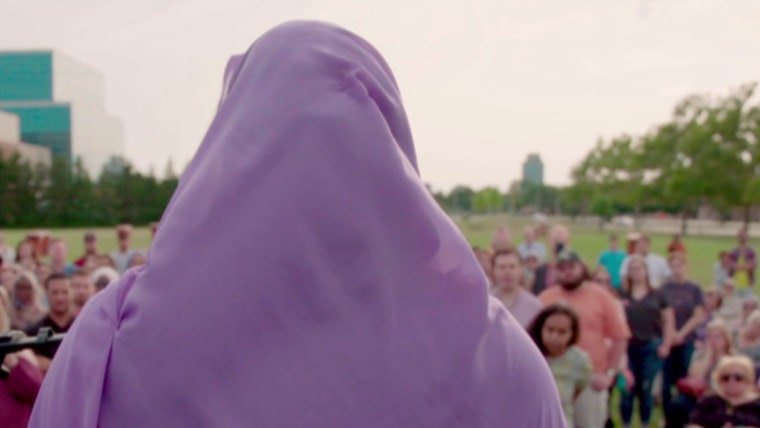https://www.msnbc.com/opinion/msnbc...2023-israel-hamas-war-islamophobia-rcna131600
My faith was largely invisible growing up. I don’t wear a hijab, and my town had very little Muslim presence. By the time the 9/11 terrorist attacks happened, my Pakistani immigrant parents were well settled in the states, with three small children. I’d go to public school and then come home to my evening Quran lessons. As a first generation Pakistani American, I was aware of the divide between my life outside the home and inside the home; having “two lives,” so to speak, just came with the territory.
As a first generation Pakistani American, I was aware of the divide between my life outside the home and inside the home.
At some point after Sept. 11, 2001, that divide began to converge in more apparent ways. Ignorant Islamophobic hate erased and contradicted the core teachings of peace at the center of Islam. Without mainstream visibility or the equalizing power of platforms like social media, Muslims, especially immigrants, felt siloed and powerless to defend themselves and their faith.
Five years after the terror attacks, my parents, grandparents, siblings and I were stopped at the U.S.-Canada border driving home from a summer vacation in Toronto. My father, a federal employee, disappeared through a separate door with the officers, while the rest of us huddled restlessly in a waiting room. About three hours later, we were back on the road. The problem? My father’s name: “Muhammad.”
This kind of blatant profiling might go viral on social media today. But this was 2006, the same year the first Muslim was elected to Congress. To date, America has elected only four Muslim lawmakers, including Congress’ sole Palestinian American, Rep. Rashida Tlaib of Michigan, who was censured by her peers in November for her criticism of Israel.

Nearly 20 years later, Muslim Americans are still fighting many of the same battles. Indeed, 2023 was defined in part by spikes in bigotry targeting both Muslims and Jews following Hamas’ terrorist attack on Oct. 7. The subsequent murder of 6-year-old Wadea Al-Fayoume, and the shooting of three Palestinian and Palestinian American men in Burlington, Vermont, were frightening reminders of the deadly impact of Islamophobic rhetoric. On Oct. 25, the Council on American Islamic Relations reported receiving “774 complaints, including reported bias incidents, since the escalation of violence in Israel and Palestine on Oct. 7,” adding that the “number of complaints is the largest wave of complaints CAIR has received in a similar time period since then-candidate Donald Trump first announced his desire to implement a Muslim ban.”
Meanwhile, Trump has retaken the campaign stage and is once again using the politics of rage and xenophobia to garner support.
But while the hate may feel sadly familiar, the Muslim American community’s ability to counter and disarm that bigotry highlights something more hopeful.
My faith was largely invisible growing up. I don’t wear a hijab, and my town had very little Muslim presence. By the time the 9/11 terrorist attacks happened, my Pakistani immigrant parents were well settled in the states, with three small children. I’d go to public school and then come home to my evening Quran lessons. As a first generation Pakistani American, I was aware of the divide between my life outside the home and inside the home; having “two lives,” so to speak, just came with the territory.
As a first generation Pakistani American, I was aware of the divide between my life outside the home and inside the home.
At some point after Sept. 11, 2001, that divide began to converge in more apparent ways. Ignorant Islamophobic hate erased and contradicted the core teachings of peace at the center of Islam. Without mainstream visibility or the equalizing power of platforms like social media, Muslims, especially immigrants, felt siloed and powerless to defend themselves and their faith.
Five years after the terror attacks, my parents, grandparents, siblings and I were stopped at the U.S.-Canada border driving home from a summer vacation in Toronto. My father, a federal employee, disappeared through a separate door with the officers, while the rest of us huddled restlessly in a waiting room. About three hours later, we were back on the road. The problem? My father’s name: “Muhammad.”
This kind of blatant profiling might go viral on social media today. But this was 2006, the same year the first Muslim was elected to Congress. To date, America has elected only four Muslim lawmakers, including Congress’ sole Palestinian American, Rep. Rashida Tlaib of Michigan, who was censured by her peers in November for her criticism of Israel.

Nearly 20 years later, Muslim Americans are still fighting many of the same battles. Indeed, 2023 was defined in part by spikes in bigotry targeting both Muslims and Jews following Hamas’ terrorist attack on Oct. 7. The subsequent murder of 6-year-old Wadea Al-Fayoume, and the shooting of three Palestinian and Palestinian American men in Burlington, Vermont, were frightening reminders of the deadly impact of Islamophobic rhetoric. On Oct. 25, the Council on American Islamic Relations reported receiving “774 complaints, including reported bias incidents, since the escalation of violence in Israel and Palestine on Oct. 7,” adding that the “number of complaints is the largest wave of complaints CAIR has received in a similar time period since then-candidate Donald Trump first announced his desire to implement a Muslim ban.”
Meanwhile, Trump has retaken the campaign stage and is once again using the politics of rage and xenophobia to garner support.
But while the hate may feel sadly familiar, the Muslim American community’s ability to counter and disarm that bigotry highlights something more hopeful.

